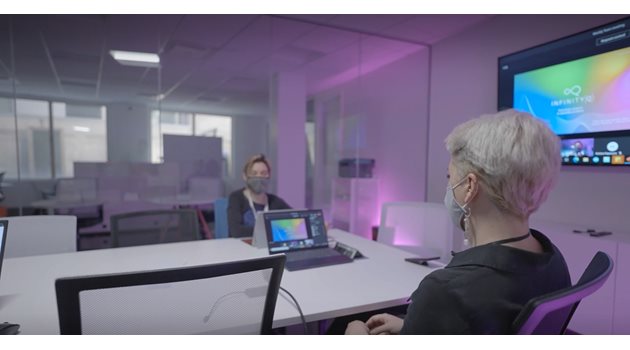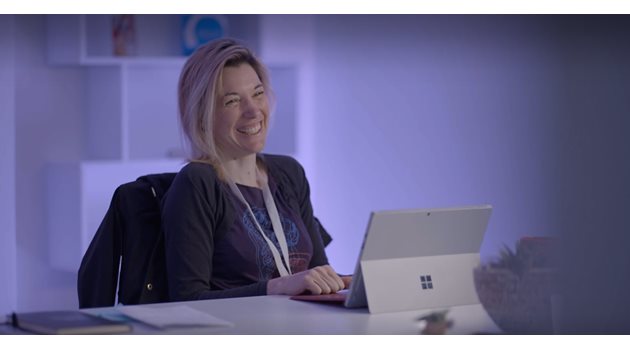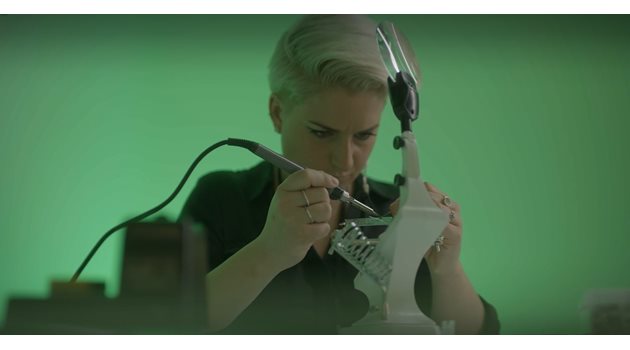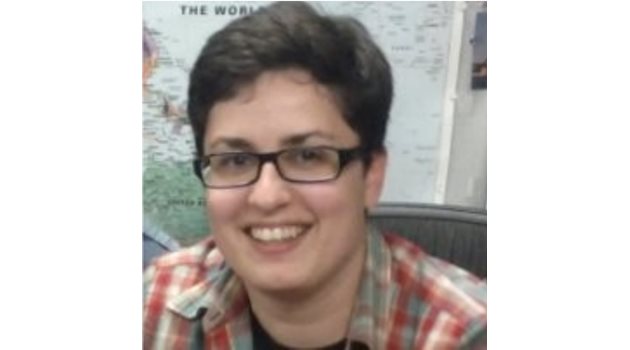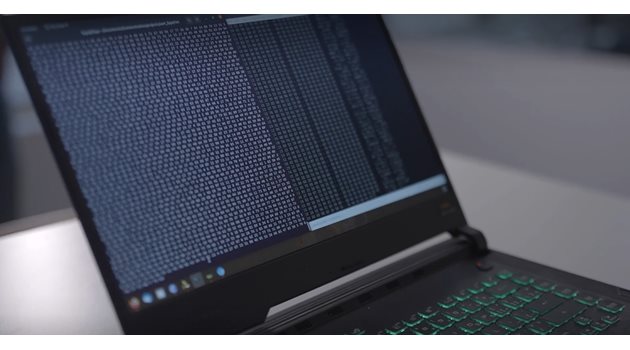And if the Bulgarian Elon Musk is a woman
When a Bulgarian and a French woman come together - one of them our greatest hope in supercomputing and quantum computing, the other a former senior officer and engineer in the French Navy, who supported the IT systems of the Rafale combat aircraft- really fantastic things can happen. But when these two ladies combine their love of technology with the theories of physics and quantum mechanics geniuses Newton, Wolfgang Pauli, Max Born, Robert Oppenheimer and Eugene Wigner, what can happen?
Something that right now Elon Musk, Jeff Bezos, Bill Gates, giants like Google and IBM would give dearly to get. But while the Silicon Valley "boys" are in a furious race and pursuing their dream of a quantum computer, Kristina Kapanova and Aurelie Helouis have chosen a different approach. They said, "We're not going to participate in this competition," and, in typical female fashion, came up with a solution that accomplishes the same goals, but much more easily and intelligently. They created a quantum chip, or quantum analog computing technology, that will be thousands of times faster than digital counterparts. So programmers around the world who only dream of having access to supercomputers can have all this luxury at home right now.
But what's even more interesting is that the little gadget boosts the speed by 100 to 1000 times, and in some tasks over 5000 times, of current incredibly fast supercomputers. That is, from now on, when scientists search for molecules and proteins for new drugs or solve complex problems in pharmaceutics, bioinformatics, molecular dynamics and mechanics, quantum chemistry and biochemistry, artificial intelligence, personalized medicine, bioengineering; when they forecast the weather, plan measures to combat climate change, etc., the time needed for these difficult and complex tasks will be many times shorter than now.
Why would a chip as big as a shoebox change the game? Because it shows that, at this stage, the mad race to see who can have a working quantum computer first can be avoided with intelligence. Right now, quantum technology is still a wonderful dream, though there are some breakthroughs there. If a regular computer works with bits, zeros and ones, a quantum one uses quantum mechanical phenomena such as superposition and entanglement. Here, information is not stored in bits, but in qubits. They can be 0, 1 or both at the same time if they are in superposition. This is what allows a quantum computer to perform a huge number of computations simultaneously, making it many times more robust than any computer to date. The problem is that it is very difficult to make these qubits "work". Quantum particles are difficult to keep in condition for more than a few seconds and require a temperature close to absolute zero (minus 273 degrees Celsius), which requires a huge amount of energy. But because we are talking about quantum particles that easily enter chaotic states, they also make a huge amount of mistakes.
That's why Kapanova and Helouis chose another path to the goal. They want the speed that quantum technology can provide, but without all the other downsides.
"Our approach is based on analogies with atomic quantum systems," Kristina Kapanova told Cosmos. "We use an artificial atom as the basic computational structure without the need to use actual atoms or molecules, which are extremely sensitive to the external environment to perform computations. These artificial atoms are built using analog electronic devices using certain quantum computing capabilities. The quantum analog device, in turn, is able to tackle a variety of optimization problems thanks to its circuitry and the use of collective analog computation to efficiently explore the space of possible solutions."
For this reason, a quantum chip is as large as a regular hard disk and yet operates at room temperature.
The two women claim that this technology can tackle some of the most complex problems in computational optimization faced by the finance, pharmaceutical, logistics, engineering, oil, gas and other industries. To prove it's not just boasting, they're giving potential customers free access to the new technology via a cloud service.
Canada enthusiastically welcomed the scientific breakthrough, leading to the virtual meeting on May 13, when Canada's Minister of the Economy Lucy Lecour, Sofia Techpark, the Petascale Supercomputer- Bulgaria consortium, and Kapanova and Helouis' Canadian quantum analog company signed a memorandum of cooperation for testing, development and application of quantum analog technologies with the Bulgarian supercomputer, Discoverer. Thus, as early as this Fall, Bulgarian and European scientists will have access to the quantum analog module to perform scientific calculations in various fields.
"The computing device has the potential to deliver 100,000 times faster computing power at low power consumption," it emerged during our online meeting.
That's why there's a huge amount of interest in the two founders from all supercomputer-owning countries right now - no one wants their machine to fall out of the Top 500 fastest in the world.
How does one get to this incredible success?
Aurelie has wanted to fly since she was a little kid and loves technology.
For 16 years, she was a senior officer in the French Navy, engineering the flights - supporting the IT systems and technology of naval aviation equipment, in particular the Rafale combat aircraft.
The military noticed the technical genius of the young girl and put her in charge of all basic responsibilities, including running important departments and being responsible for assets of immense value. Thus, on board the aircraft carrier, she found herself the first women technical director of the Rafale squadron, ensuring the operational readiness of the twin-engine fighter in operations and exercises. She rose to the post of Chief Operating Officer of the Landivisio Naval Air Station.
She will never forget how in Djibouti, Africa one Sunday morning, her officer told her she had to make a presentation about the plane. "I said, 'OK, no problem,'" Aurelie recalls. - "The presentation was to the president of Djibouti," he replied. “Really? Say what? I had an hour,” Helouis recalls, “how to prepare? What to do? How do I present the plane and its capabilities? Stand in front of it, smile? I kept saying to myself, ‘Lord, Lord, Lord, how is this possible?’"
"I was a woman in a predominantly male world," she told Cosmos. "I learned a lot in the military, but I wanted to show what women could do, too. Rafale was a modern aircraft, and I was in charge of all the computing systems. That was what gave me a good opportunity to start a new career in civilian life."
At some point, the entrepreneurial spirit awoke in her. "I decided to go to Canada, enrolled in university and got a master's degree in business administration," she says. “I started the transition from military to civilian life, it was complicated, but I followed my dreams - I wanted to be an entrepreneur, that's my passion."
Along with a new life, she rediscovered love in Montreal. With one marriage behind her and two children, she met her Royal Navy colleague there. By that time, he too had ended his marriage and was looking after his child. Sparks ignited and today they all live as one big family with their three children and one little baby.
However, there is still time until that moment. Alongside her master's degree, Aurelie started working for a global company that manufactures aircraft engines. She had a solid contract, and by the looks of it, she would have finished her career there; however, the university completely changed her life when it organized an event to promote entrepreneurship. There, they discussed different ideas, and it seemed that Aurelie impressed the director of an incubator. At the end of the training, he told her, "If you want a great tech idea, a technical co-founder and half a million dollars, send me an email."
"Why not," Aurelie laughs today, "I decided to email him and quit my secure full-time job to become an entrepreneur. I had found my calling." The first attempt wasn't very successful, but after a few more she got into quantum technology.
While at the MILA institute, she had lunch with a friend. Gradually, the conversation turned to her beloved quantum physics, to the almost mystical effects of particles, to Schrodinger's cat (which can be both alive and dead at the same time), to the possibility of developing a quantum chip without the need for the temperature to be around absolute zero. This colleague mentions that one of the best specialists on this topic is the Bulgarian, Dr. Kristina Kapanova. At that time she was involved in the construction of the Bulgarian supercomputers with Prof. Stoyan Markov and teaching at Trinity College in Dublin. Kapanova is a specialist in high-performance and quantum computing, and her experience in artificial intelligence is enviable.
"I was looking for a new approach to the quantum system," says Aurelie, "I wanted it to work at room temperature. I knew I had to see Krisi and then start the company. Since she was in Europe, I took the plane to see her and have lunch. We discussed quantum mechanics, new approaches, but along the way we became good friends and I'm really happy to have met her."
The pandemic, however, prevented the departure of the Bulgarian to Canada. Today, they both laughingly say that this is the reason why quantum technology was born in Krisi's home in Sofia. Joking or not, it became her new office because of the numerous lockdowns. At the first loosening of the measures, Krisi went to Canada to test the technology and immediately after became CTO at the up-and-coming company. The news quickly spread and members of the advisory board became no less interesting figures. John Mullen, a former assistant director of the CIA. Philippe Dolphus, Director of Research at France's largest science center, the Centre National de la Recherche Scientifique (CNRS). Also on the board, Michel Kurek, former Head of Algo Factory and Quantitative Trading at Societe Generale. Thanks to the efforts of this entire team, today more and more financial institutions and pharmaceutical companies want to test smart technology.
Asked by Cosmos why all the bigger discoveries in recent years are not being made in global firms but in smaller ones like Modern, Biontech, Aurelie says, "Good question. We often talk about this paradigm. Giants prefer to let the small ones try. If something works - OK, if not - keep trying. We decided to change the game."
And they're changing it, because the tool works and big banks in the UK, Canada and the US are behind the small Canadian start-up, looking for innovative companies to invest in.
"Our technology is different from everyone else's," says Kapanova, "With quantum computers, one of the difficulties is keeping those qubits under control to achieve accuracy. But we don't concentrate on subatomic particles because they are hard to control. Particularly at large scale, there are many challenges and so we took a different approach - we designed a chip that, without going into detail, is easy to build, there are thousands of qubits that are under control simply because there is nowhere for them to go, no need for low temperature- just room temperature- no need to build new connections to the whole computer infrastructure. Connectivity is easy and everything works here and now.
With quantum computers, the downside is that there is a lot of noise and a lot of errors happen. With [infinityQube] this happens much less because it is analogous to an atomic object. We are going to put it in the new Bulgarian supercomputer and for me, as a Bulgarian scientist, it is a great honour to give the scientific community an incredible opportunity to make better and faster calculations. I really wanted as a researcher to help my home country first."
It is not a coincidence that after Sofia and the Czech supercomputing center in Ostrava asked to receive the smart technology, and after that the requests from other EU centers started.
Moreover, the gadget is still a prototype and the company is yet to organize mass production and increase speed and efficiency.
According to Kapanova, although some companies are making advances in quantum computers, they will never displace supercomputers because there are too many limitations to quantum technology. Her prediction is that there will not be an efficient quantum computer in the next few years, maybe even ten; until then Kapanova is fulfilling a dream she had as a scientist - to use all of quantum’s goodies through a cloud service open to all with 3 coding libraries used by 90% of the scientific community. These are libraries with billions of data in the fields of molecules, substances, proteins, data from physics, natural sciences and engineering...
"Everybody can use them from their homes and immediately start programming, coding, see the result of their work in microseconds, and be able to visualize it," Kapanova says, “I'm happy that young scientists in Bulgaria will be able to do such exciting things in science and technology now, not years from now. And maybe one day, in 10 years, Sofia will become the innovative digital hub of Southeast Europe, where the infrastructure for the next generations will be created."
Krisi's dreams for the country and for technology are even bigger, and if Bulgaria ever has an Elon Musk of its own, they will probably look a lot like her.

